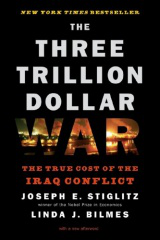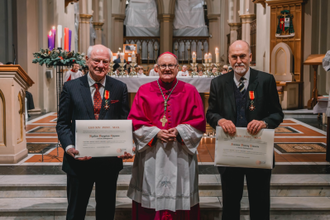Call to Chilcot Inquiry to look at all costs of Iraq War

A network of individuals and groups, including Pax Christi, Fellowship of Reconciliation, Justice not Vengeance, Movement for the Abolition of War and Coventry Deanery Justice & Peace Group has written to Sir John Chilcot, urging that the Iraq Inquiry investigate the financial costs to the UK of the Iraq War as an essential aspect of the fulfillment of the Inquiry's remit.
In their letter they draw on the work of Joseph Stiglitz, Nobel Laureate in Economics, and Linda Bilmes in their publication, The Three Trillion Dollar War: The true cost of the Iraq Conflict, suggesting that the Inquiry carry out investigation into areas such as: budgetary costs, long-term care for veterans and their families, the resetting of defence capabilities, those costs incurred by the country but not sustained by the government, macroeconomic effects of the war and, finally and perhaps most importantly, how to learn from our mistakes.
It is now widely accepted that the Iraq War has been a disaster. At a time when financial issues loom large in the mind of politicians and the general public alike, there is ever more urgency to determine how this bears on such critical matters as the decision to take a country to war, and how that responsibility should be borne.
The new government will be undertaking a Strategic Defence Review and these issues must be taken note of in that Review.
Full text of the letter follows.
STATEMENT TO THE IRAQ INQUIRY: CALCULATING THE TRUE COSTS OF THE WAR
The Inquiry has not so far delved into the actual costs of the war to the UK. We are therefore writing to you to strongly suggest that the Committee should give some time and attention to this matter.
Following the publication in 2008 of the book The Three Trillion- Dollar War by Joseph Stiglitz and Linda Bilmes, academics of the highest order, it might have been expected that experts in defence economics on this side of the Atlantic would have taken up the same sort of analysis of the costs to the UK.
As far as we can tell, this has not happened. There is consequently a large gap in public understanding about the total, and long-term, economic ramifications of this war for this country, a consideration which clearly bears on ‘the best interests of the country’, which is the essential focus of the Inquiry.
Among those experts in the field who might be equipped to speak to the Committee on the topic, we could single out Professor Ron Smith of Birkbeck College, Professor Malcolm Chalmers of RUSI, Professor Paul Dunne of the University of the West of England, and Professor Keith Hartley of York University.
Following the line taken by Stiglitz and Bilmes in their book, we would suggest an investigation into areas such as: budgetary costs, long-term care for veterans and their families, the resetting of defence capabilities, those costs incurred by the country but not sustained by the government, macroeconomic effects of the war and, finally, how to learn from our mistakes.
This last point brings us back to the fundamental remit of the Inquiry – ‘to identify the lessons that can be learned’. We suggest that the reforms proposed by Stiglitz and Bilmes have much to teach us in the UK. Indeed, it should not be beyond the bounds of possibility that these two authors might well be invited to assist the Committee in its deliberations.
They have formulated a set of principles for a closer scrutiny and a more accurate assessment of the cost of going to war, such as to make that decision more exacting, and deliberately so. Of greatest interest could be their suggestion that any war must be funded by a specific surtax, so that costs cannot be deferred, but remain the responsibility of those who make the decision – be they elected representatives or those who elect them.
Examples of confused and contradictory statements abound. For example, in his evidence to the Inquiry, the Prime Minister asserted that the Iraq War had cost the country £8 billion, and the Afghan War £10 billion. Stiglitz and Bilmes put the UK’s expenses at over £20 billion on the Iraq war alone, and they are at pains to emphasise throughout their survey that their estimates have been deliberately restrained.
A similar degree of confusion surrounds claims made for the cost of the war in Afghanistan, which is not the strict concern of the Inquiry. Nevertheless, this confusion provides further evidence of the existence of the same problem.
The Inquiry might well think that reliable and comprehensive information about costs ought to be presented to the country in a coherent and checkable manner.
Source: Pax Christi


















